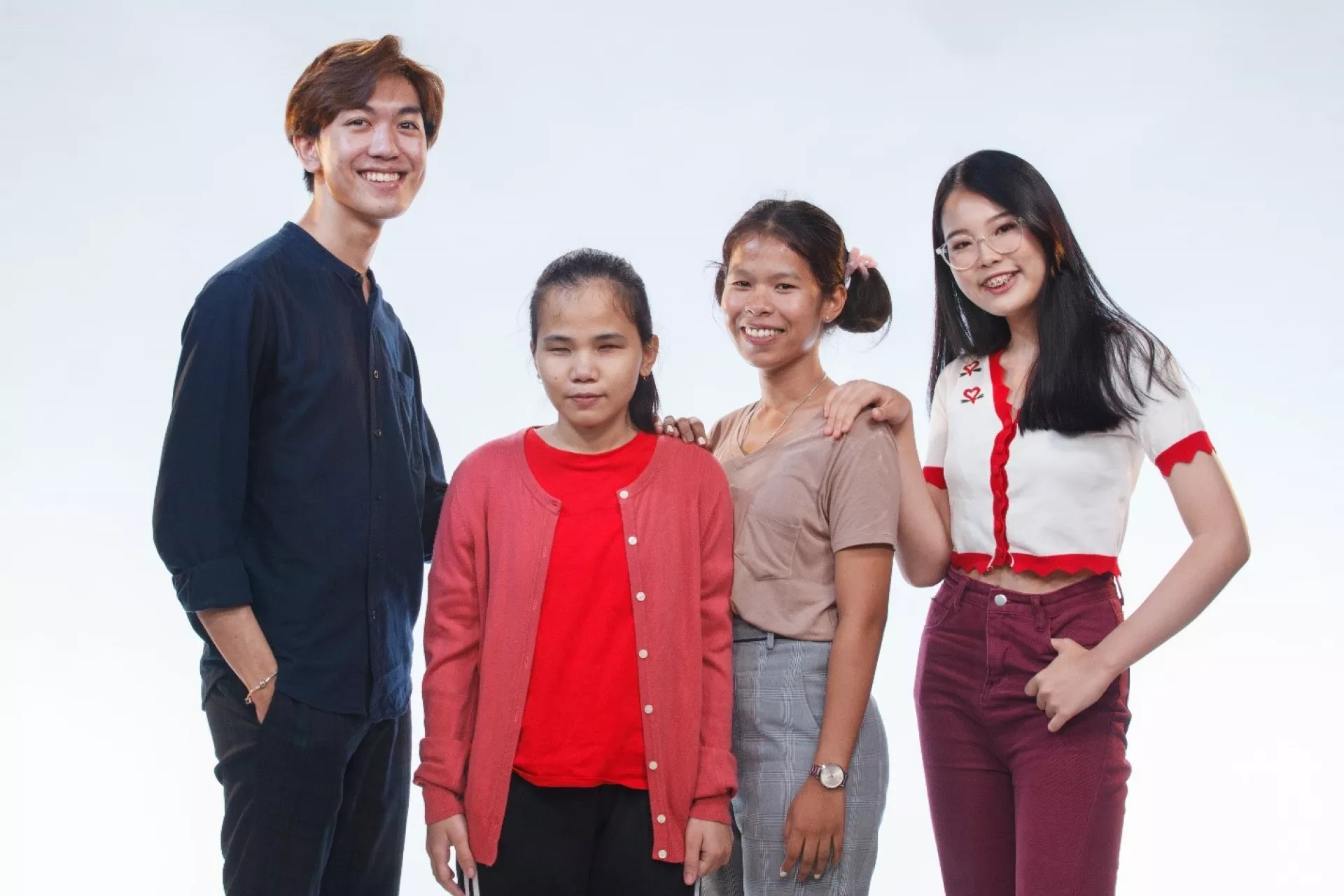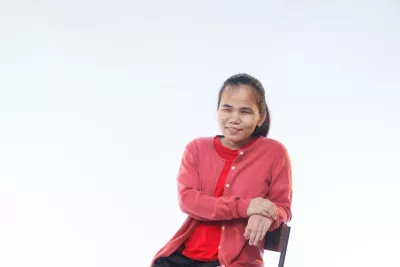The Sound of Happiness: Youth Stories
Upcoming special youth episode

- Available in:
- English
- ไทย
As part of The Sound of Happiness variety talkshow podcast series, we bring to you young people from different walks of lives who have faced a variety of challenges. Listen to find out about the fight of a mental health youth activist, the life of a child of migrant workers whose entire life has only been in Thailand but remains stateless, a girl with visual impairment who shows herself to be just as capable as others, and an LGBTQ young person who advocates for gender equality. Does it sound like we’re inviting you to listen to heart aching stories? Actually, we’re inviting you to hear firsthand inspiring stories of resilience and strength.
It’s not about sympathy, it’s about empathy – which we can all learn more about from each other. This special episode is coming soon! Find out about these inspiring stories and decode the ‘mystery’ of youth mental health together on 8 October on JOOX and UNICEF Thailand.
Let’s find out who these youth are
 Ammarin Boonsaard (Ame), 21
Ammarin Boonsaard (Ame), 21

Ammarin Boonsaard (Ame), 21, is an active member of the Thai Youth Committee. He feels that there is still a lack of representation of the LGBTIQ community, so he volunteers to speak on behalf of his peers.
For as long as he can remember, he always knew that he was different. While he is fortunate to have grown up in a family whose parents understand and accept who he is, many are not so lucky and have fallen victim to poor mental health. Some parents even bring their LGBTIQ children to visit doctors with the hope to change their sexual orientation. “What they don’t understand is that it cannot be cured because it is not a disease. We were born with it,” said Ame. “You love your child the moment they are born. It shouldn’t change when they choose to identify as LGBTIQ.”
It appears to Ame that in the public’s general view, LGBTIQ people have to work harder to be accepted to compensate for not being straight. “But what if we can’t be special? Will you not accept us?” Ame questioned. Working as a Youth Committee member, he wants to change the social mindset and show that LGBTIQ people are just like the rest of us. They have the right to live a normal and happy life too. It’s unfair for them to be negatively judged. Their sexual orientation may differ, but “we are like you — we are like everyone else!” Ame emphasized.
Ame continues to work in support of LGBTIQ rights, especially among youth so that they can stand up for themselves. He believes that if an LGBTIQ child can open up to their parents early and explain their identity, the parents may have time to gradually adjust their views and accept their children as they are.
 Kamollug Tongdang (Palm), 20
Kamollug Tongdang (Palm), 20

“I was born 100 per cent blind and have lived my life as a person with blindness all my life,” Kamollug Tongdang (Palm), 20, began her story. “I don’t feel out of place when I’m with people with the same or similar disability. The problem arises when I’m with people who don’t have visual impairments, especially in my own family.”
Due to a lack of understanding, people are often concerned that people with visual impairment may not be able to see well and therefore hurt themselves when moving around. “I once wanted to help but my family wouldn’t let me connect electrical wires,” Palm said. “I can feel them, but they wouldn’t even let me try.” Although her family had good intentions, they ended up hurting Palm’s feelings by not being careful with their words.
“Another time was when they told me they would be out and quickly come home, but I found out later that they actually went out to eat together,” said Palm about being left out. Incidents like these frustrate her and often leave her feeling offended. “I’m just blind. There’s nothing wrong with me,” she highlighted.
Just like any teenager, Palm turns to her friends when she feels troubled. “Sometimes I can’t talk to my family because they won’t understand,” she said. “I feel very relieved after I vent to friends.” It is clear that the inability to see does not stop her from seeking joy in life. Currently, Palm is working part-time and earns an extra allowance to spend on things she enjoys.
 Oo, 19
Oo, 19

“My full name on papers is Ms. Oo – that’s it. No last name,” said Oo, 19. Oo was born in Thailand and has called Thailand home all her life. But because her parents are migrant workers, she has not been recognized as a citizen by any country and is therefore stateless. “Even though my parents came to Thailand legally with proper documents, I’m stateless because I was born at home and don’t have a birth certificate,” she said.
Oo has never been to anywhere else but Thailand, yet according to her papers she is not Thai and therefore struggles to enjoy freedom and other rights. After finishing secondary school, she encountered several obstacles in accessing higher education. Some of the major ones were the requirements for a student loan and that some faculties required Thai citizenship for application. “As a child, I didn’t see this so much as a problem. Not until I wanted to continue my education and go to university,” Oo said. Still, this did not stop her from trying to reach her dream and fight her way through. “To come to Bangkok was another issue though. I had to ask for permission and carry a permit. It feels almost like captivity,” she said.
Now she is a proud freshman at the Faculty of Social Sciences at Thammasat University. She doesn’t know what awaits her, but she will not let anything stop her. “When I feel down, I tell myself that I’m capable. I’ve made it this far, and I won’t stop,” Oo concluded with hope in her eyes, wishing to pass on positivity to those who feel discouraged and want to give up.
 Prachaya Sirimahaariyapoya (Ya), 15
Prachaya Sirimahaariyapoya (Ya), 15

Young Prachaya Sirimahaariyapoya (Ya), 15, opened up about her interest in the issues of mental health: “I was in third grade and saw a friend being so stressed that he slit his wrists as a way to reduce his mental pain.” That was when she realized that her friend was having mental health problems and decided to accompany him to a psychiatrist. However, Thai law at the time did not allow children under 18 to consult mental health counsellors without parental permission. “His parents wouldn’t accept that their son needed to see a psychiatrist,” Ya said. “They had the traditional view that having a mental health problem means that something is very wrong with you.” Without proper treatment, Ya’s friend inflicted self-harm and made other suicide attempts but was fortunate to have been rescued in time. After several more incidents, his parents had to bring him to a psychiatrist.
“My friend wouldn’t have reached that level had he received mental health care earlier,” Ya spoke of her concerns. To help children and young adults like her friend, she worked with her peer youth advocates who believe that children and youth should have the right to seek mental health counsellors by themselves without a parent chaperone. They were able to make a change in the law.
“Being sad and depressed doesn’t mean there is something wrong with you. This notion should definitely stop,” Ya concluded with a strong voice.




